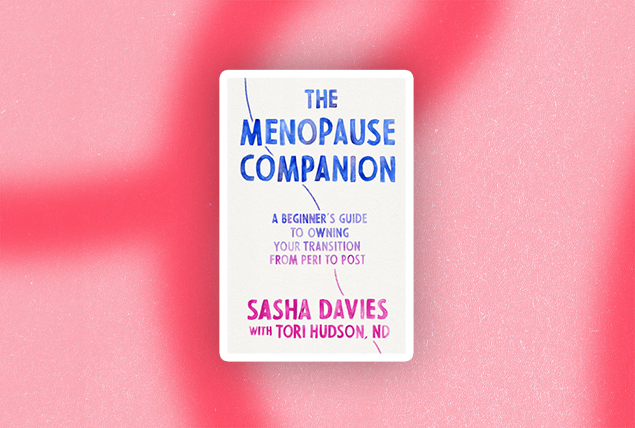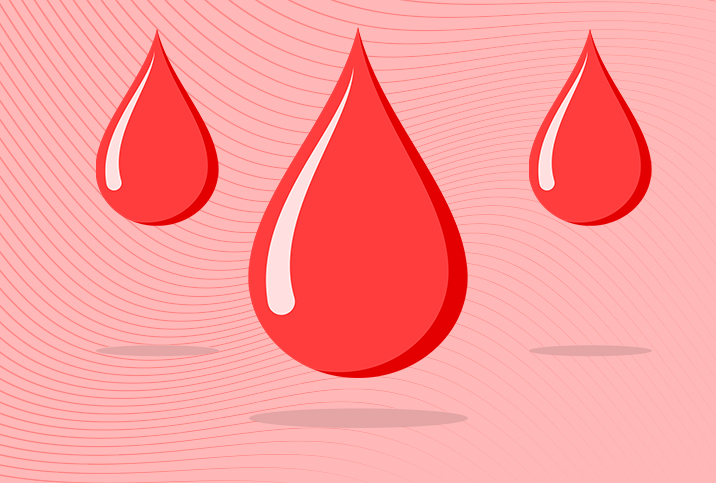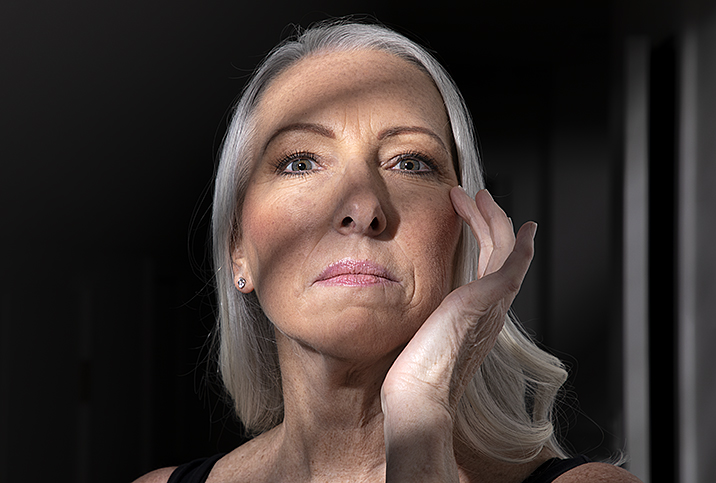Between the Pages: 'Menopause Companion' Offers Evidence-Based Advice

Key Points
- Author Sasha Davies addresses the lack of support for menopause after hearing about the experiences of her friends.
- Menopause can affect societal views of a woman's worth, vitality and appearance.
- The only commonalities between individuals experiencing menopause are the cessation of ovulation, the end of menstrual cycles and infertility.
Sasha Davies makes menopause more transparent in the book "The Menopause Companion: A Beginner's Guide to Owning Your Transition from Peri to Post," published by Roost Books.
Co-written by naturopathic physician Tori Hudson, N.D., "The Menopause Companion" offers easy-to-understand information on menopause, a life event that is both physiological and psychosocial and highly variable symptomatically.
In this exclusive interview, Davies discusses her motivation to write this menopause book and the various ways in which the life stage has become a cultural construct.
Editor's note: This interview has been edited for length and clarity.
In your books, you specialize in making complex topics accessible to a general audience. How did that lead you to write this menopause book?
Sasha Davies: I had a couple of friends who were a few years older than me and they started talking about what was going on in their life and telling me about the symptoms they were experiencing.
I realized I had no idea what menopause was or what it meant was going to happen. They were experiencing slightly different symptoms, and I decided I would learn what I could. I started asking other friends what they knew about it and realized most of us didn't know much.
When I read about menopause, I didn't see much about the physical symptoms my friends were going through, even though they were disruptive to their day-to-day routine. Also, they were just experiencing a degree of struggle that caught them really off guard.
They'd say, "Everyone's telling me this is natural and normal, but I'm really struggling. I'm really having a hard time figuring this out. And I don't really feel like I'm getting the support that I want or need."
That was both from practitioners they were seeing and a little bit from their partners.
I found the basics of menopause very quickly. Mayo Clinic can tell you, "Hey, your periods are gonna stop. Your ovaries are basically gonna stop ovulating, and you're not gonna be allowed kids anymore." Then there was a laundry list of symptoms a person could have. There was also some information about hormone therapy.
Those were all very readily accessible, but they all seemed like a pamphlet doctors might hand you on your way out of the office. Helpful, but just at baseline.
As I was listening to my friends, I was thinking, "What about this other part?" Pamphlets can make things sound straightforward but can make you feel like something's wrong with you if you can't deal with it or if it feels so disruptive in your life.
I got very curious about that part, asking myself, "What are the other forces at play that make this complicated?"
Recommended
- Sex After Menopause: Menopause doesn’t mark the end of sex. These remedies can help sex stay enjoyable at any age.
- A Dating Guide for Menopausal Women: Getting older does not have to be the end of romance. Shed the stigma with a dose of confidence.
- Big Boobs—What Should You Know About Supporting Your Girls?: Experts explain how to find the best bra for big breasts.
What are the ways in which menopause is a cultural construct?
Sasha Davies: That's one of the most astonishing things I read about in the book "Invisible Women" by Caroline Criado Perez. She talked about the fact that in textbooks and medical school, there's anatomy and then there's female anatomy. The female body is seen as a derivative of the body.
That sets a specific stage for anything that happens in a female body.
When I think about menopause, particularly in Western culture, I think about what is valued. I would not say we are a culture that values the wisdom of the elderly or even the "not young." To me, there's a construct about what some of the constructs of menopause touch up against.
For example, what you look like as your body goes through this change and what your body is now capable of. Of course, fertility is no longer part of your capabilities. That feels problematic in certain contexts.
Some people who go through menopause talk about feeling looked at as less useful in the eyes of our culture, and that they themselves have this connection to a certain sense of vitality they can feel weighing as they move out of having this monthly cycle—a constant reminder of their fertility.
I also think about the value proposition of being a middle-aged woman in America. It's very different than being a young woman with this sense of "you're on the rise." There's this sense that when the average person goes through menopause you are in the middle, and the middle is not a place we get excited about.
I don't believe that's true, and there are many, many people who do not feel this way. I'm talking about broader cultural narratives rather than saying every person's experiences are this. However, these cultural narratives are at play.
So many things about femininity are tied to fertility and youth. They're absolutely tied to whiteness. As in every construct in our culture, there's a racial component to the construct of menopause. Not to say only white people go through menopause, but they're the dominant image.
In fact, so many of the images promoting products designed for women and their menstrual cycles—or for when they're not having menstrual cycles—focus on the white identity and white appearance. And a heterosexual cisgendered construct comes into that mix as well.
There are dozens and dozens of potential symptoms. Is it fair to say that every person's experience with menopause will be different?
Sasha Davies: Absolutely. The only similarity is you won't ovulate; you won't have a regular cycle; you won't have a menstrual bleed; and you won't be fertile. You won't be able to have children.
Those are the commonalities.
What are a few things you'd like to say about preparing yourself for menopause?
Sasha Davies: Someone asked me recently if the book is about my experience with menopause. I immediately kind of recoiled at the notion. It's not a memoir—it's a guidebook.
But, after doing some events to promote the book, I realized that while this book isn't about my specific menopause-like symptoms and emotions, it is absolutely about my experience of learning about menopause.
What I did was essentially write down the instructions I thought someone would need or want as they navigated this transition in a way that felt aligned with who they are and what served them. My tips or recommendations are all about finding people in your life who you can openly talk to about your body practice, especially talking about those parts of your body you're not always comfortable talking about. That will pay dividends in many ways.
Between the Pages: 'Sexuality: A Graphic Guide': Author Meg-John Barker explains why the comic book medium is perfect for exploring sex. This 176-page comic book takes readers on a Scooby-Doo gang-like journey as the four main characters encounter monsters like patriarchy, heteronormativity, ableism and white supremacy. The book is packed with quotes from (and illustrations of) leading sex researchers and theorists to help make academic topics more accessible and fun.
Sexual health and having a healthy sex life are all about communication. People who go through menopause should support each other and talk. That will help you get your needs met and help you advocate for yourself, with a clinician, with a partner, with your workplace, whatever.
Learn to pay attention to what's happening in your body. Because some of these changes come on really fast and can be caused by many things.
Are you not sleeping at night because it's perimenopause or are you not sleeping at night because you're freaked out about something? Or maybe you're not sleeping at night because you've got a new pet and they're sleeping on the bed?
You have to pay attention. How long have the symptoms been going on? When did they start and how have they progressed? How are they developing? Those are questions you'll need to answer when you seek medical help.
It takes time and capacity. I know there are a lot of people who are really burnt out and worked to the bone, and this feels like a really big ask and another thing on the to-do list. But it's worth it.


















